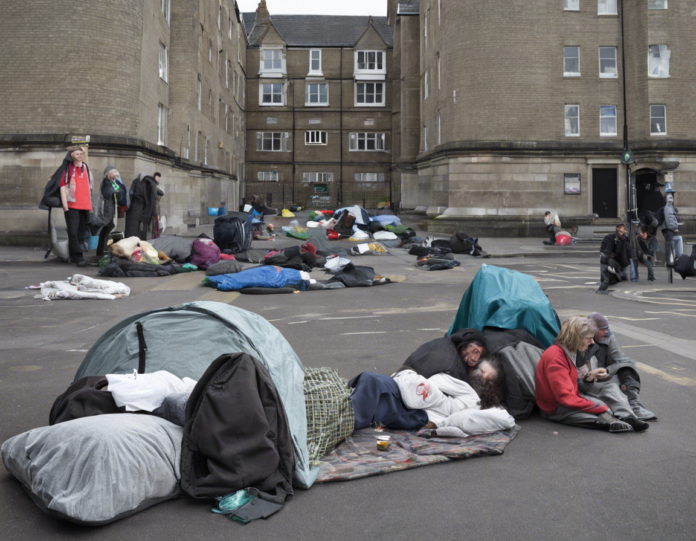Introduction
Homelessness is a critical issue affecting many countries worldwide, including the UK. While efforts are being made to address homelessness through various policies and initiatives, there is a growing debate on whether criminalising homelessness could be a potential solution. Proponents of criminalising homelessness argue that it can help address the issue by incentivising people to seek help and reducing the visibility of homelessness in public spaces. However, opponents believe that such an approach is inhumane and fails to address the root causes of homelessness. In this article, we will explore the arguments for criminalising homelessness in the UK and examine the potential consequences of such a policy.
The Current State of Homelessness in the UK
Before delving into the debate on criminalising homelessness, it is essential to understand the current state of homelessness in the UK. According to the latest data from homelessness charity Shelter, an estimated 280,000 people are homeless in England, with rough sleeping on the rise. The causes of homelessness are complex and multifaceted, including factors such as lack of affordable housing, poverty, family breakdown, and mental health issues.
Arguments for Criminalising Homelessness
1. Deterrence: Proponents of criminalising homelessness argue that by making it illegal to be homeless, individuals will be deterred from living on the streets. This approach is based on the belief that the threat of legal consequences will incentivise people to seek shelter and support services.
2. Public Safety: Another argument in support of criminalising homelessness is that it can help improve public safety. Homeless individuals are often associated with antisocial behaviour, substance abuse, and crime. By criminalising homelessness, proponents believe that these issues can be better addressed, making public spaces safer for everyone.
3. Encouraging Help-Seeking Behaviour: Criminalising homelessness can also be seen as a way to encourage individuals to seek help and support services. By making it illegal to live on the streets, people may be more motivated to access shelters, housing assistance, and healthcare services that can address the underlying causes of their homelessness.
4. Reducing the Visibility of Homelessness: Critics of homelessness often argue that the visibility of homeless individuals in public spaces can have a negative impact on perceptions of safety and cleanliness. By criminalising homelessness, proponents believe that the presence of homeless individuals in public areas can be reduced, improving the overall aesthetics of the city and attracting more tourism and investment.
The Consequences of Criminalising Homelessness
While the arguments for criminalising homelessness may seem compelling on the surface, it is essential to consider the potential consequences of such a policy. Criminalising homelessness raises serious ethical, legal, and practical concerns that need to be carefully evaluated.
1. Human Rights Violations: Criminalising homelessness can be seen as a violation of basic human rights. Homelessness is often a result of systemic issues such as poverty, lack of affordable housing, and inadequate support services. Punishing individuals for being homeless without addressing these root causes is unjust and inhumane.
2. Pushing Homeless Individuals into Hidden Spaces: By criminalising homelessness, individuals may be pushed into hidden spaces such as abandoned buildings, parks, or secluded areas. This not only exacerbates the isolation and vulnerability of homeless individuals but also makes it harder for outreach workers to provide support and services.
3. Criminalisation Does Not Address Root Causes: Criminalising homelessness is a superficial solution that fails to address the root causes of the issue. Without adequate support for mental health, addiction, affordable housing, and poverty, individuals may continue to cycle in and out of the criminal justice system without meaningful change.
4. Impact on Vulnerable Populations: Criminalising homelessness disproportionately affects vulnerable populations, including women, children, LGBTQ individuals, and people of colour. These groups already face systemic barriers to accessing support services, and criminalisation further marginalises and stigmatises them.
5. Diverting Resources from Effective Solutions: Resources devoted to enforcing laws criminalising homelessness could be better spent on proven solutions, such as affordable housing initiatives, mental health support, addiction treatment, and social services. Investing in these areas can address the root causes of homelessness and help individuals rebuild their lives.
Frequently Asked Questions (FAQs)
1. Is homelessness a choice?
Homelessness is rarely a choice but is often the result of complex factors such as poverty, lack of affordable housing, mental health issues, and family breakdown. Criminalising homelessness fails to address these underlying causes.
2. How does criminalising homelessness impact homeless individuals?
Criminalising homelessness can further marginalise and stigmatise homeless individuals, pushing them into hidden spaces and making it harder for them to access support services.
3. What are the alternatives to criminalising homelessness?
Alternative solutions to criminalising homelessness include investing in affordable housing initiatives, mental health support, addiction treatment, and social services. These approaches address the root causes of homelessness and help individuals rebuild their lives.
4. Does criminalising homelessness improve public safety?
While proponents argue that criminalising homelessness can improve public safety by addressing antisocial behaviour, substance abuse, and crime, there is little evidence to support this claim. Criminalising homelessness may push people into hidden spaces, making it harder to address these issues effectively.
5. How can communities support homeless individuals?
Communities can support homeless individuals by advocating for affordable housing, volunteering at shelters, donating to homelessness charities, and connecting homeless individuals with support services in their area. Building a compassionate and inclusive community is essential in addressing homelessness effectively.
Conclusion
Criminalising homelessness is a contentious issue that raises important questions about the intersection of poverty, public policy, and human rights. While proponents argue that criminalisation can deter homelessness and improve public safety, the ethical and practical implications of such a policy cannot be ignored. Addressing homelessness requires a holistic approach that focuses on addressing the root causes of the issue and providing support services to those in need. By investing in affordable housing, mental health support, and social services, communities can create a more compassionate and inclusive society where everyone has a place to call home.

